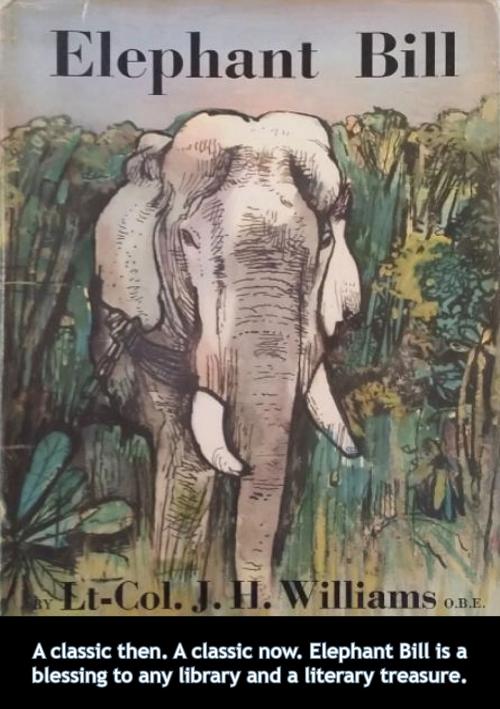| Author: | Lt.-Col. J. H. Williams O.B.E. | ISBN: | 9781786259363 |
| Publisher: | Verdun Press | Publication: | July 26, 2016 |
| Imprint: | Verdun Press | Language: | English |
| Author: | Lt.-Col. J. H. Williams O.B.E. |
| ISBN: | 9781786259363 |
| Publisher: | Verdun Press |
| Publication: | July 26, 2016 |
| Imprint: | Verdun Press |
| Language: | English |
A book comes along like this once in a lifetime. You read it as a small child, or even an adult, and never forget the images it conjures up of a wonderful Englishman who lives in the mysterious forests of faraway Burma and of the kind native people who teach him about their lovely country. But most of all, you never forget the elephants! For this is a story about those magnificent creatures. Though he was officially known as Lt. Colonel J. H. Williams, the author was known to the world at large as Elephant Bill. That is because he spent 25 years living with the elephants in the mountains and forests of Burma. There he trained them to haul teak logs out of the isolated jungles.
Yet this is also a story of great courage, because when the Second World War struck it also came to Burma. The Japanese Imperial Army planned to confiscate the Burmese elephants, drafting them to make the bridges and railways they needed to invade India. When he learned of these plans to put his beloved animals to a war-like purpose, Elephant Bill knew what had to be done. The mighty kings of the jungle had to be evacuated to safety.
This is thus the story not only of the peaceful days in the jungle, starting in 1921, but also the story of the largest elephant rescue in history. It tells the amazing account of how Elephant Bill, along with his friends and family, rode 45 of the great beasts across the mountains of Burma, before reaching safety in faraway India.
A classic then. A classic now. Elephant Bill is a blessing to any library and a literary treasure.
A book comes along like this once in a lifetime. You read it as a small child, or even an adult, and never forget the images it conjures up of a wonderful Englishman who lives in the mysterious forests of faraway Burma and of the kind native people who teach him about their lovely country. But most of all, you never forget the elephants! For this is a story about those magnificent creatures. Though he was officially known as Lt. Colonel J. H. Williams, the author was known to the world at large as Elephant Bill. That is because he spent 25 years living with the elephants in the mountains and forests of Burma. There he trained them to haul teak logs out of the isolated jungles.
Yet this is also a story of great courage, because when the Second World War struck it also came to Burma. The Japanese Imperial Army planned to confiscate the Burmese elephants, drafting them to make the bridges and railways they needed to invade India. When he learned of these plans to put his beloved animals to a war-like purpose, Elephant Bill knew what had to be done. The mighty kings of the jungle had to be evacuated to safety.
This is thus the story not only of the peaceful days in the jungle, starting in 1921, but also the story of the largest elephant rescue in history. It tells the amazing account of how Elephant Bill, along with his friends and family, rode 45 of the great beasts across the mountains of Burma, before reaching safety in faraway India.
A classic then. A classic now. Elephant Bill is a blessing to any library and a literary treasure.




![Cover of the book The Battle For Leyte Gulf [Illustrated Edition] by Lt.-Col. J. H. Williams O.B.E.](https://www.kuoky.com/images/2014/august/300x300/9781782899112-NyDQ_300x.jpg)



![Cover of the book From Gallipoli To Baghdad [Illustrated Edition] by Lt.-Col. J. H. Williams O.B.E.](https://www.kuoky.com/images/2014/august/300x300/9781782895541-9iCj_300x.jpg)


![Cover of the book Smith-Dorrien [Illustrated Edition] by Lt.-Col. J. H. Williams O.B.E.](https://www.kuoky.com/images/2015/november/300x300/9781786255228-kEY1_300x.jpg)
![Cover of the book The Long Road To Victory [Illustrated Edition] by Lt.-Col. J. H. Williams O.B.E.](https://www.kuoky.com/images/2014/august/300x300/9781782892687-k2po_300x.jpg)


![Cover of the book Allenby’s Final Triumph [Illustrated Edition] by Lt.-Col. J. H. Williams O.B.E.](https://www.kuoky.com/images/2014/august/300x300/9781782895480-sNIV_300x.jpg)